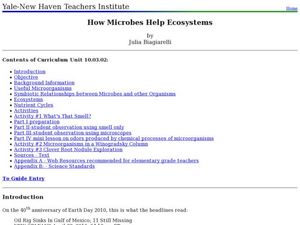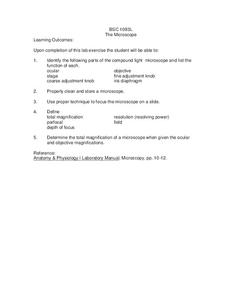Curated OER
Waterworks
Young scholars investigate the water quality of a river. In this water quality lesson plan, students use microscopes, probing devices, and global positioning systems to determine water quality and create presentations on it.
Curated OER
Pond Life Identification Kit
Young scholars explore ecology and biodiversty. They use the wet-mount procedure to make several slides to view using the microscope and draw what they see.
Curated OER
How Microbes Help Ecosystems
Sixth graders observe different microorganisms under the microscope. In this biology lesson, 6th graders draw and describe the samples they see. They study the root nodules of plants and explain how the plants benefit from those bacteria.
Curated OER
The Microscope
In this microscope lesson students explore the compound light microscope. Students discover techniques concerning cleaning, storage and proper use of the microscope. Students discover the working parts of the compound light microscope as...
Curated OER
The Global Precipitation Measurement Mission (GPM) Lesson
Introduce your class to one of the ways that technology is benefiting humanity. The Global Precipitation Measurement Mission involves the data collected by nine satellites from different countries with a united focus on studying world...
Curated OER
Using A Winogradsky Column to Analyze Microbial Communities
Students use easily obtained materials to study ecological succession in a microbiological community. This investigation is appropriate for a variety of age groups. Elementary Students be fascinated by the changes occurring over time...
Curated OER
Introduction To Insect & Spider Body Parts
Learners inspect several different specimens of insects and spiders to determine characteristics that are similar and different between the two groups. They identify the basic body structure of spiders and insects and then predict where...
Curated OER
Elaine Humphrey, Gwynne Thompson
Second graders become familiar with the parts of the microscope and how it works. In this microscope lesson plan, 2nd graders experiment with different light and settings. Students answer questions based on their...
Curated OER
Looking at French Decorative Arts: The Science of Good Design
Students examine the style of an 18th-century compound microscope and its case. In this scientific design lesson plan, students look at Jacques Caffieri's, "Compound Microscope and Case" before comparing the design to a modern...
Curated OER
Hair
In this forensic science learning exercise, students identify the different parts of the hair. They complete 18 short answer questions on how hair evidence is used in forensics.
Curated OER
The Absorption of Solar Energy
Two sequential parts to this lesson introduce your class to the electromagnetic spectrum, the ability to absorb radiant energy, and the pigments in leaves that are responsible for collecting sunlight to be used in the photosynthetic...
Curated OER
Cell Size and Shape; Diffusion and Osmosis Processes
Use salmon eggs as a cell model for demonstrating the movement of water over concentration gradients. Junior scientists examine the same process microscopically with an onion cell. They use a thistle tube and a semipermeable membrane to...
Curated OER
Cell Structures and Their Functions
Life science learners investigate live cells. They examine wet mount slides of cyanobacteria and Elodea plants. They peer into the dynamic microscopic world of protists. Afterward, they construct a model of a cell, including rudimentary...
Curated OER
Flower Power
Students explore the parts of flowers and how they reproduce. They dissect flowers and observe the reproductive organs. Students observe anthers and ovaries of Tiger Lilies under a microscope. They investigate how insects and other...
Curated OER
Transportation in Plants
Learners investigate how plants transport water and nutrients through the plant. In this transportation in plants lesson plan, students use glass tubing, celery stalks, food coloring and leaves from plants to observe adhesion and...
Polar Trec
Plankton Parents
Plankton are so abundant in the ocean they outweigh all of the animals in the sea. In this three day activity, groups discuss and become familiar with plankton, capture females, and look for egg production on day three.
Curated OER
Scavenger Hunt: A Group Collection
Students be complete a collection of living organisms and systems from the school campus.
Curated OER
It's Just a Phase They're Going Through!
In this science worksheet, students write about the stages of mitosis. Students prepare an onion slide and examine the cell.Students draw about the stages they see.
Curated OER
Word Structure-Prefix and Suffix
Young scholars identify the common prefixes and suffixes used in the English language. They dissect a word into its various (root, prefix, suffix) parts and use a dictionary to determine the proper usage and derivation of each word...
Curated OER
Invisible Life
By setting up an aquarium in the classroom, learners are able to describe some macroscopic and microscopic organisms that are found inside. This well-designed, and educationally rich lesson requires pupils to use microscopes to view...
Kenan Fellows
Microorganisms in Pond Water
That is living in the water? Groups of two to three view pond water with microscopes in order to find microorganisms. They draw pictures of the ones they find in their slides. The groups compare their drawings to pictures of common...
Curated OER
Cell Works
Young scholars observe slides of cork cells and discuss the use of microscopes. They view a power point presentation on "Looking Inside Cells" and take notes aligned with the PPT presentation. They collaborate with a partner to create an...
Curated OER
Evidence of Photosynthesis
Hands on science is the way to go! Learners conduct a lab experiment to help them explain how plants make food through photosynthesis. They test for the presence of starch in leaves using iodine solution and identify the basic things...
Baylor College
They're Everywhere: Bacteria
Totally gross out your class with the eighth lesson in this series on food science. Explore the microscopic world of bacteria by taking swabs of different classroom objects and growing colonies in petri dishes. An engaging activity that...

























